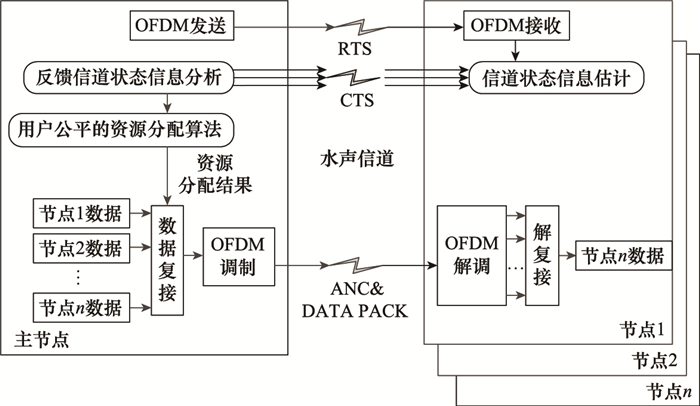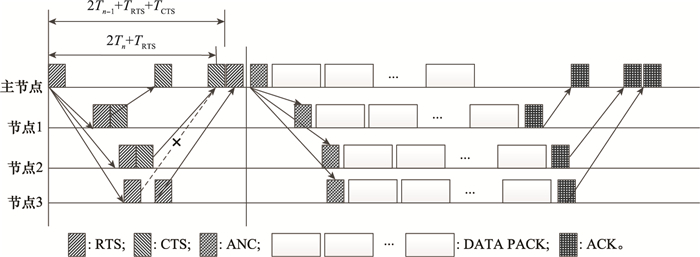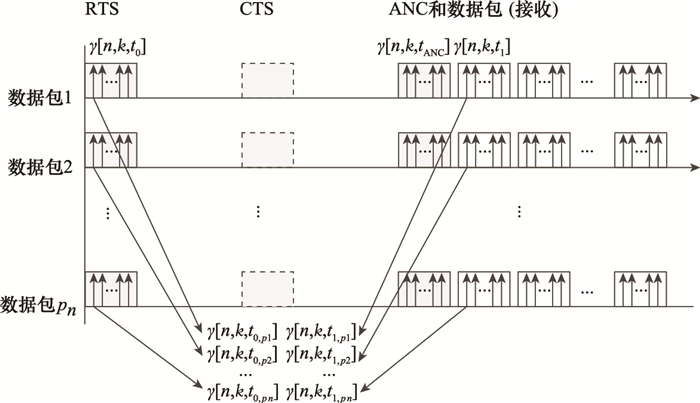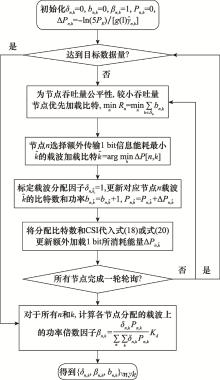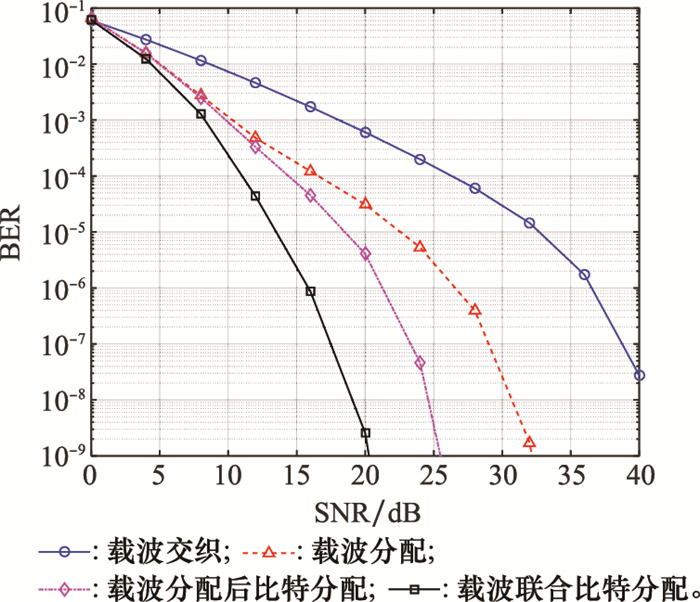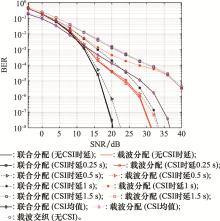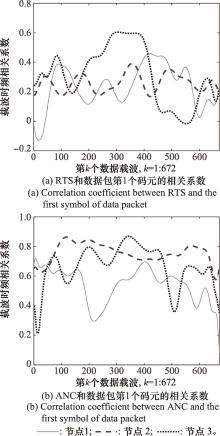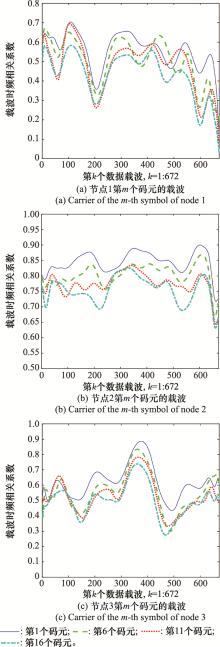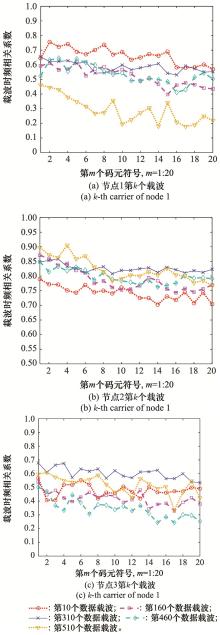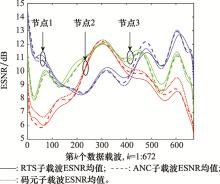Systems Engineering and Electronics ›› 2021, Vol. 43 ›› Issue (8): 2321-2331.doi: 10.12305/j.issn.1001-506X.2021.08.35
• Communications and Networks • Previous Articles Next Articles
Underwater acoustic adaptive OFDMA based on feedback channel state information
Yuzhi ZHANG1,*, Yanjing SUN2, Bin WANG1, Yang LIU1
- 1. School of Communication and Information Engineering, Xi'an University of Science and echnology, Xi'an 710054, China
2. School of Information and Control Engineering, China University of Mining and Technology, Xuzhou 221116, China
-
Received:2020-07-27Online:2021-07-23Published:2021-08-05 -
Contact:Yuzhi ZHANG
CLC Number:
Cite this article
Yuzhi ZHANG, Yanjing SUN, Bin WANG, Yang LIU. Underwater acoustic adaptive OFDMA based on feedback channel state information[J]. Systems Engineering and Electronics, 2021, 43(8): 2321-2331.
share this article
| 1 | 王海斌, 汪俊, 台玉朋, 等. 水声通信技术研究进展与技术水平现状[J]. 信号处理, 2019, 35 (9): 1441- 1449. |
| WANG H B , WANG J , TAI Y P , et al. Development and the state of the art in underwater acoustic communication[J]. Journal of Signal Processing, 2019, 35 (9): 1441- 1449. | |
| 2 | 隋泽平, 鄢社锋. 噪声鲁棒变步长LMS算法及其在OFDM水声信道均衡中的应用[J]. 系统工程与电子技术, 2020, 42 (7): 1605- 1613. |
| SUI Z P , YAN S F . Noise robust variable step-size LMS algorithm and its application in channel equalization for OFDM underwater communications[J]. Systems Engineering and Electronics, 2020, 42 (7): 1605- 1613. | |
| 3 |
TAO J . DFT-precoded MIMO OFDM underwater acoustic communications[J]. IEEE Journal of Oceanic Engineering, 2018, 43 (3): 805- 819.
doi: 10.1109/JOE.2017.2735590 |
| 4 |
WEN M W , CHENG X , YANG L Q . Index modulated OFDM for underwater acoustic communications[J]. IEEE Communications Magazine, 2016, 54 (5): 132- 137.
doi: 10.1109/MCOM.2016.7470947 |
| 5 |
QARABAQI P , STOJANOVIC M . Statistical characterization and computationally efficient modeling of a class of underwater acoustic communication channels[J]. IEEE Journal of Oceanic Engineering, 2013, 38 (4): 701- 717.
doi: 10.1109/JOE.2013.2278787 |
| 6 |
RADOSEVIC A , AHMED R , DUMAN T , et al. Adaptive OFDM modulation for underwater acoustic communications: design considerations and experimental results[J]. IEEE Journal of Oceanic Engineering, 2014, 39 (2): 357- 370.
doi: 10.1109/JOE.2013.2253212 |
| 7 | WAN L. Underwater acoustic OFDM: algorithm design, DSP implementation, and field performance[D]. Doctoral Dissertation: University of Connecticut, 2014. |
| 8 |
WAN L , ZHOU H , XU X , et al. Adaptive modulation and coding for underwater acoustic OFDM[J]. IEEE Journal of Oceanic Engineering, 2015, 40 (2): 327- 336.
doi: 10.1109/JOE.2014.2323365 |
| 9 | 罗亚松, 许江湖, 胡洪宁, 等. 正交频分复用传输速率最大化自适应水声通信算法研究[J]. 电子与信息学报, 2015, 37 (12): 2872- 2876. |
| LUO Y S , XU J H , HU H Y , et al. Research on self-adjusting OFDM underwater acoustic 3 algorithm for transmission rate maximization[J]. Journal of Electronics & Information Techno-logy, 2015, 37 (12): 2872- 2876. | |
| 10 | 罗亚松, 胡生亮, 刘志坤, 等. 正交频分复用水声通信自适应调制算法[J]. 国防科技大学学报, 2017, 39 (1): 153- 158. |
| LUO Y S , HU S L , LIU Z K , et al. Self-adjusting modulation algorithm for orthogonal frequency division multiplexing underwater acoustic communication[J]. Journal of National University of Defense Technology, 2017, 39 (1): 153- 158. | |
| 11 |
ZHANG Y Z , HUANG Y , WAN L , et al. Adaptive OFDMA with partial CSI for downlink underwater acoustic communications[J]. Journal of Communication and Networks, 2016, 18 (3): 387- 396.
doi: 10.1109/JCN.2016.000054 |
| 12 | 何呈, 赵安邦, 王谋业. 浅海声传播及多途信号分解[J]. 系统工程与电子技术, 2016, 38 (8): 1922- 1928. |
| HE C , ZHAO A B , WANG M Y . Shallow water sound propagation and multipath signal decomposition[J]. Systems Engineering and Electronics, 2016, 38 (8): 1922- 1928. | |
| 13 | 马璐, 刘淞佐, 乔钢. 水声正交频分多址上行通信稀疏信道估计与导频优化[J]. 物理学报, 2015, 64 (15): 289- 298. |
| MA L , LIU S Z , QIAO G . Sparse channel estimation and pilot optimization for underwater acoustic orthogonal frequency division multiple access uplink communications[J]. Acta Physica Sinica, 2015, 64 (15): 289- 298. | |
| 14 | TU K, DUMAN T, STOJANOVIC M, et al. OFDMA for underwater acoustic communications[C]//Proc. of the Conference on Communication, Control, and Computing, 2011. |
| 15 | ZHANG Y Z, YU L, WANG A Y. Underwater acoustic multi-user OFDM bit loading with Markov chain based channel state information prediction[C]//Proc. of the IEEE Charleston Oceans Conference, 2018. |
| 16 | 陈肇邦. 多用户水声OFDM系统通信链路资源优化[D]. 杭州: 浙江大学, 2019. |
| CHEN Z B. Resources allocation for communication link of multi-user underwater acoustic OFDM system[D]. Hangzhou: Zhejiang University, 2019. | |
| 17 |
QIAO G , LIU L , MA L , et al. Adaptive downlink OFDMA system with low-overhead and limited feedback in time-varying underwater acoustic channel[J]. IEEE Access, 2019, 7, 12729- 12741.
doi: 10.1109/ACCESS.2019.2892812 |
| 18 |
ZHOU S , GIANNAKIS G B . Adaptive modulation for multiantenna transmissions with channel mean feedback[J]. IEEE Trans.on Wireless Communications, 2004, 3 (5): 1626- 1636.
doi: 10.1109/TWC.2004.833411 |
| [1] | Bozhi DONG, Jiang ZHU, Haibo ZHANG. SCMA-based energy efficiency resource allocation scheme in amplify-forward relay system [J]. Systems Engineering and Electronics, 2022, 44(6): 2035-2042. |
| [2] | Hong ZOU, Chenyang BAI, Peng HE, Yaping CUI, Ruyan WANG, Dapeng WU. Edge service placement strategy based on distributed deep learning [J]. Systems Engineering and Electronics, 2022, 44(5): 1728-1737. |
| [3] | Yuanyuan ZHANG, Yang GAO, Peng ZHU, Jintao LIU, Shushan GU. UAV reconnaissance tactical planning based on colored Petri nets [J]. Systems Engineering and Electronics, 2022, 44(3): 900-907. |
| [4] | Shanxue CHEN, Shengjin WU, Bowen GU. Energy efficiency optimization algorithm for uplink NOMA systems with time reversal [J]. Systems Engineering and Electronics, 2022, 44(3): 1007-1013. |
| [5] | Xueyong YU, Ye ZHU, Lixiang QIU, Hongbo ZHU. Energy efficient offloading strategy for UAV aided edgecomputing systems [J]. Systems Engineering and Electronics, 2022, 44(3): 1022-1029. |
| [6] | Zhenzhen YAN, Bo LI, Mao YANG, Zhongjiang YAN. Hybrid non-orthogonal multiple access method based on genetic algorithm [J]. Systems Engineering and Electronics, 2021, 43(3): 832-838. |
| [7] | Fatang CHEN, Zhihao ZHANG, Hebin LI, Zhiqiang MEI. Fairness resource allocation algorithm based on OFDMA scheduling access in 802.11ax system [J]. Systems Engineering and Electronics, 2021, 43(11): 3352-3359. |
| [8] | Chunqi JIANG, Na'e ZHENG, Zong ZUO, Sheng WANG, Xiang CHEN. Antenna selection of distributed MIMO radar on target tracking with key target highlighted [J]. Systems Engineering and Electronics, 2021, 43(10): 2860-2868. |
| [9] | Yunxiang CHEN, Yan LI, Zhongyi CAI, Zezhou WANG. Allocation method of aircraft maintenance support resources based on HTCPN [J]. Systems Engineering and Electronics, 2020, 42(9): 2130-2139. |
| [10] | Zeping SUI, Shefeng YAN. Noise robust variable step-size LMS algorithm and its application in OFDM underwater channel equalization [J]. Systems Engineering and Electronics, 2020, 42(7): 1605-1613. |
| [11] | Wanli CHENG, Jing ZHANG, Hui WANG. Cluster-based resource allocation scheme in ultra-dense network [J]. Systems Engineering and Electronics, 2020, 42(7): 1623-1629. |
| [12] | Xiaoge HUANG, Yifan CUI, Dongyu ZHANG, Qianbin CHEN. Joint optimization scheme of task offloading and resource allocation based on MEC [J]. Systems Engineering and Electronics, 2020, 42(6): 1386-1394. |
| [13] | Zhengjie LI, Junwei XIE, Haowei ZHANG, Zhaojian ZHANG. Joint power and bandwidth allocation algorithm based on collocated MIMO radar [J]. Systems Engineering and Electronics, 2020, 42(5): 1041-1049. |
| [14] | Hui WANG, Jing ZHANG, Wanli CHENG. Energy-efficient multiuser-multichannel matching algorithm in NOMA systems [J]. Systems Engineering and Electronics, 2020, 42(11): 2636-2643. |
| [15] | SHI Weiguo, XU Chao. Time delay prediction based on phase space reconstruction and robust extreme learning machine [J]. Systems Engineering and Electronics, 2019, 41(2): 416-421. |
| Viewed | ||||||
|
Full text |
|
|||||
|
Abstract |
|
|||||

